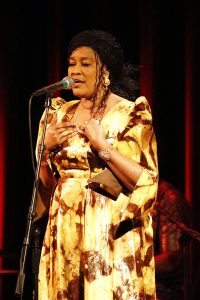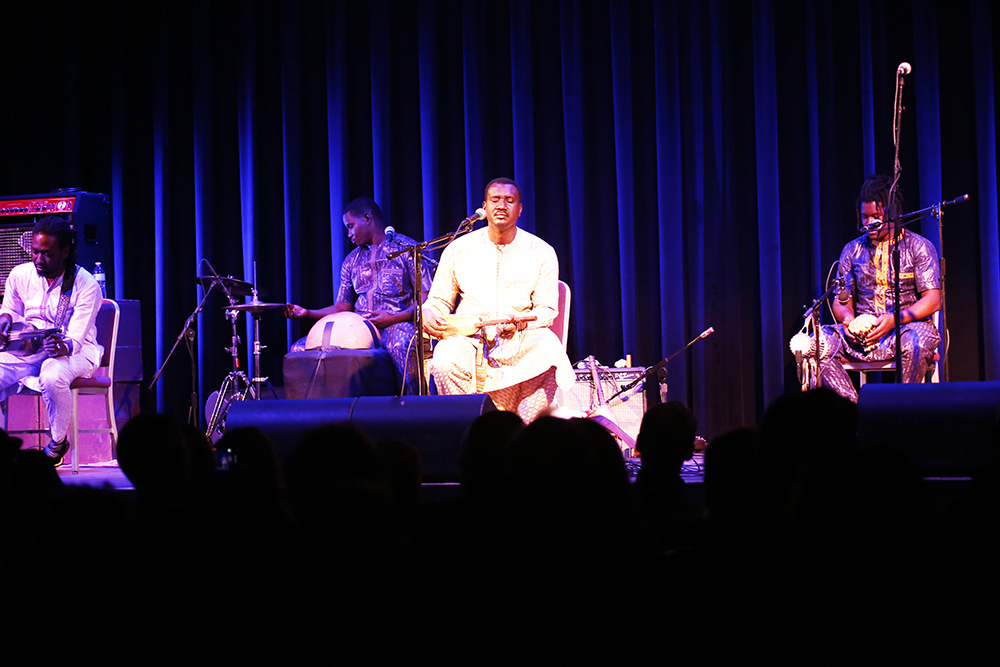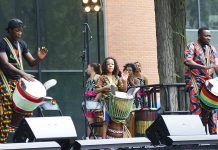
Over 200 people sat in the audience welcoming waves of Malian music wash over them. Bassekou Kouyaté and Ngoni Ba played on the Cedar Cultural Center’s stage Saturday evening, April 22nd in Minneapolis delivering the magical sounds.
All of the instruments were of the centuries-old traditional style including two ngonis, a calabash, a tama also known as a talking drum, a yabara that is a hand-held percussive gourd, a calabash, and the human voice provided primarily by Bassekou’s spouse, Amy Sacko. All of these time-honored instruments were enhanced by electronic pick-ups.
As the instruments are hybrids of old and new, so too was the sound created. Bassekou Kouyaté seeks to play with tradition while incorporating pop styles. He kept his audience entranced.
The band trouped on stage at 8:15 immediately warming the hall with a slowly developing melody, like dipping one’s toes into the water to check for temperature. The rhythm picked up and suddenly the song came to a close.

Chérif Keïte, Carleton College professor, jumped on stage to provide commentary on the songs and to offer song titles as well. Bassekou Kouyaté spoke to us in French and occasionally English, preferring to have Keïte speak on his behalf.
At the start of the third song, Keïte said, “The essence of Mali is in music. If you try to suppress music, you’re committing cultural genocide,” a sentiment that Bassekou strongly agreed with.
The ngoni is a very unassuming instrument. It’s plain without scrolls or intricate pegs or fancy engraving, made of a simple brown wood or gourd with an animal skin stretched over the top. In Bassekou’s hands, it bursts with intricate melodies. Both Bassekou and his son, Madou Kouyaté, play one on stage, Madou’s larger ngoni has a deeper sound.
The fourth song of the evening, Jama Ko, (Come Together) is an appeal to humanity, a call for unity. Keïte impulsively called out, “Let’s go to Mali together!”
Bassekou shouted into the crowd to find out where people are from, thinking he’s performing mostly for a local crowd. When he heard people call back, “Togo…Mali…Rwanda” and other countries in Africa, he smiled broadly and said, “Ah, yes…tonight is a good night.”
The Cedar’s sound was in good form with Bassekou signaling adjustments to be made by the sound engineers for various instruments and voices throughout the evening. When each band member took a solo, Bassekou made sure technical issues didn’t mar the sound.
The audience was thrilled when Mahamadou Tounkara stepped from the back of the stage to center to play his talking drum. The tama is a small drum, held under the armpit and struck with an L-shaped stick. When the musician squeezes his arm down on the drum’s sides, the resulting sound fluctuates in pitch as if talking. Tounkara added dance moves to titillate us even more.
Keïte quipped, “Africa can make instruments of anything, that’s the genius of Africa.”
The show was almost over when Keïte tells Bassekou something in Bambara or French. They engaged in a lengthy conversation and then Keïte urged a woman to come to the stage. In the audience, with her pipa in its case sat Gao Hong, a world-class pipa player.
She climbed the steps and explained to the audience that she’d been performing at another concert earlier that day so she was dressed in her stage costume. She had her pipa with her because it was too cold to remain in the car while she attended Bassekou’s show.
Hong, also a professor at Carleton College, hails from China. Her instrument was shaped similarly to a violin with an ornate scroll on top, but it closer to the size of a small cello. She held it upright between her legs as she sat on a chair to play it.
Having never played together before, but finding themselves suddenly performing in unison, Bassekou and Hong decided to each play a series of notes and then echo one another. Eventually they found a pattern to create a melody and the rest of the band joined in. It was perhaps an historic moment, a first for the two instruments to be played together in concert, an Asia meets Africa musical moment.
An amazing tribute to Sekou Kingdom of Central Mali, long since its reign, comprised the band’s encore and after almost two hours of music, the show was over. The audience filed out, fully satisfied with the accomplished players who’d entertained them for the evening, bringing the warmth of Mali to this cold Minnesota spring.
About Susan Budig
Susan is based in Minneapolis and reports on general assignments for Mshale with a focus on entertainment. In addition to reporting, she is also a writer, poet, teacher and coach.
- Web |
- More Posts(158)







